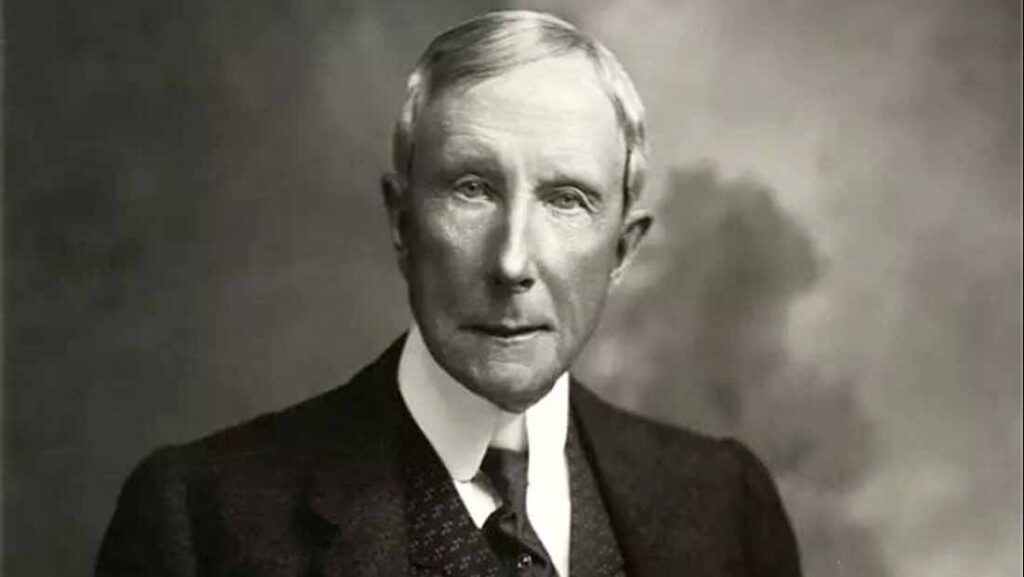Business and Philanthropy
John D. Rockefeller (1839–1937) was an American businessman and philanthropist. He is known as the founder of the Standard Oil Company, one of the largest corporations of the time, and as one of the richest men in history. Rockefeller began his career in the petroleum business in the 1860s and, through a series of mergers and acquisitions, built Standard Oil into a dominant monopoly in the oil market. As his fortune grew, Rockefeller became a major philanthropist, donating large sums of money to charitable causes and founding institutions such as the University of Chicago and the Rockefeller Museum. Although in his time he was criticized for his business practices, his legacy remains important in the history of business and philanthropy.
Family life
John D. Rockefeller had a large family. He married Laura Celestia “Cettie” Spelman in 1864 and together they had five children: John Jr., Elizabeth, Alice, Alta and Edith. The family lived in a large mansion in Cleveland, Ohio, and then in a large property in New York called Kykuit.
Rockefeller and his wife were dedicated to charitable and philanthropic causes, and their children also became involved in these activities. John Jr. followed in his father’s footsteps in the oil business and also became a major philanthropist. Elizabeth devoted herself to charity and education, while Alice became involved in art and culture.
The Rockefeller family also faced personal challenges. One of his sons, John Jr., suffered from mental illness and was hospitalized several times. Despite this, the family maintained a positive public image and continued their charitable and philanthropic activities.
In general, the Rockefeller family is characterized by being a united family, with a great spirit of service and commitment to society.
Business Achievements
John D. Rockefeller achieved several important business achievements during his career. Some of the most notable are:
Foundation of the Standard Oil Company : In 1870, Rockefeller founded the Standard Oil Company along with other partners. Through a series of mergers and acquisitions, he built the company into a dominant monopoly in the oil market. Standard Oil became one of the largest and most successful companies of the time, and Rockefeller became one of the richest men in history.
Development of the oil industry: Rockefeller helped develop the petroleum industry by establishing an efficient system of oil production, distribution, and transportation. He pioneered the creation of transportation infrastructure, such as pipelines and tankers, which allowed Standard Oil to sell oil at lower prices than its competitors.
Innovations in management: Rockefeller introduced several innovations in business administration, such as centralizing decision-making and standardizing products. He also established a rigorous accounting system to measure the company’s performance and used this information to make strategic decisions.
Standard Oil Division: In 1911, the U.S. government brought a lawsuit against Standard Oil for monopoly. As a result, the company was forced to split into 34 independent companies, including some of the largest oil and gas companies in history, such as ExxonMobil, Chevron and Amoco. Although the split was seen as a defeat at the time, many of the resulting companies remained very successful.
In short, John D. Rockefeller was a visionary entrepreneur, who founded and built one of the largest companies in history, innovated management, and contributed to the development of an entire industry.
Social achievements
In addition to his entrepreneurial achievements, John D. Rockefeller also had a significant impact on society through his philanthropy and commitment to social causes. Some of the most notable social achievements include:
Philanthropy: As his fortune grew, Rockefeller became a major philanthropist. He donated large sums of money to charitable causes, such as education, health and child welfare. He also founded several institutions, such as the University of Chicago and the Rockefeller Museum, which have had a lasting impact on society.
Education: Rockefeller supported education in several ways. He donated large sums of money to universities and schools, helping to establish research programs and scholarships. He also helped found the University of Chicago, which became one of the best educational institutions in the country.
Public Health: Rockefeller also supported public health through his donations. He helped establish several hospitals and medical research centers, including Rockefeller Hospital in New York. In addition, he donated large sums of money to the fight against diseases such as leprosy and malaria.
Child welfare: Rockefeller was also committed to causes related to child welfare. He helped establish several institutions to help poor and disadvantaged children, including schools, orphanages and foster homes.
Agriculture: Rockefeller also supported agriculture in the American South, helping to establish research and extension programs, and donating large sums of money to help farmers improve their crops and improve their lives.
In short, John D. Rockefeller was a philanthropist and advocate for social causes, who contributed large sums of money and resources to multiple areas of society, such as education, health, child welfare, agriculture, and research.
Rockefeller Health
John D. Rockefeller was known for taking care of his health and maintaining a healthy lifestyle. Throughout his life, he devoted himself to regular eating and exercise habits, and followed a strict daily routine to maximize his productivity and well-being.
However, as he aged, he began to face health problems. At age 70, he suffered from a heart attack, but recovered quickly. However, at age 87, he suffered a second heart attack that left him in critical condition. Despite the efforts of doctors, his health gradually deteriorated and he died at the age of 98.
In general, John D. Rockefeller worried about his health throughout his life, but at the end of his life, despite his healthy lifestyle, he had health problems that eventually led to his death.
The Death of Rockefeller
John D. Rockefeller died on May 23, 1937, at the age of 98. His death was caused by a combination of health problems, including a second heart attack he had suffered in previous years and respiratory problems.
The Death of Rockefeller was considered a major national event in the United States, due to his status as one of the richest and most powerful men of the time. His funerals were large and elaborate, attended by representatives from all walks of American life, from political and business leaders to representatives of charities and civil society.
In short, John D. Rockefeller’s death was caused by age-related health problems, and was an important event in American history, due to his status as a leading figure in the country’s society and economy.


